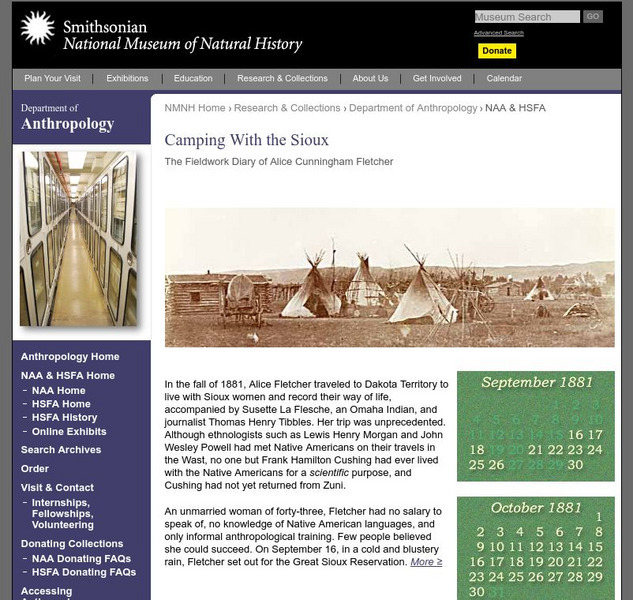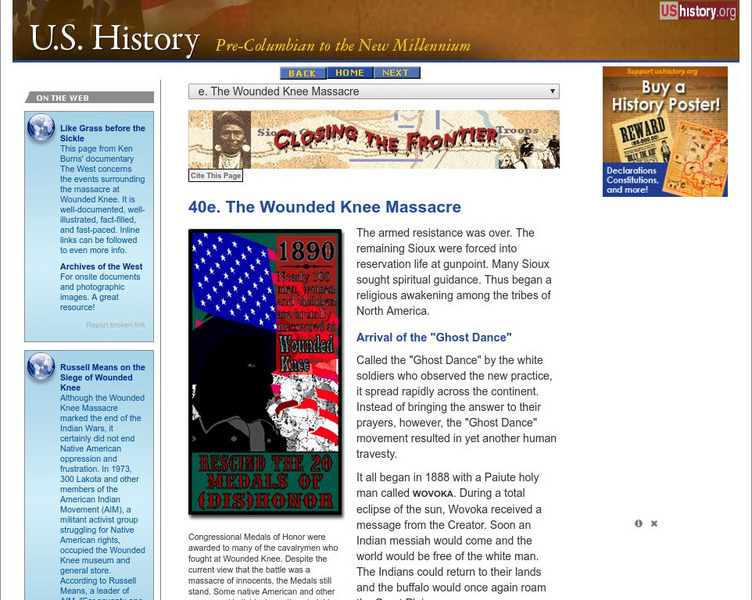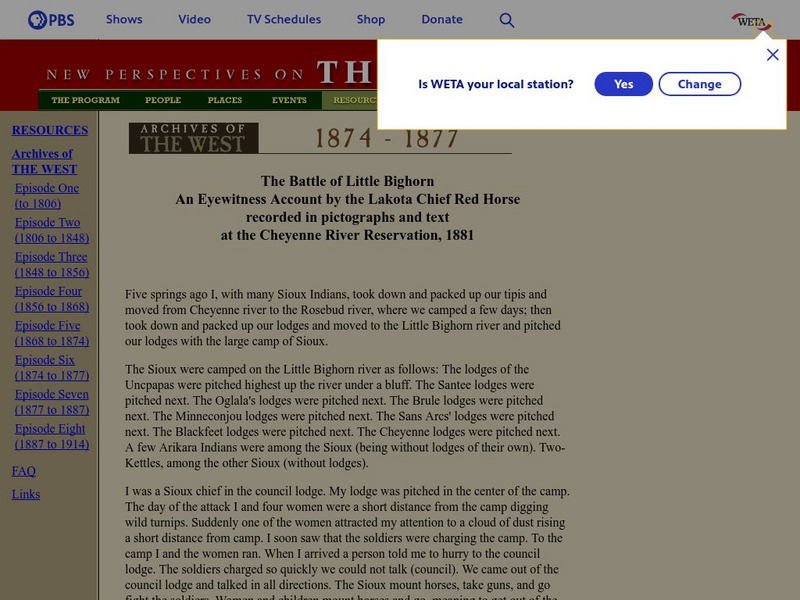Curated OER
Conflict On The Plains
Eighth graders investigate the culture and lifestyles of the Lakota Sioux and the Northern Cheyenne tribes. They use a variety of resources for research. They create questions based on information to be used during classroom discussion...
Curated OER
Lakota Beaded Leather Bag
Students examine and review Lakota beadwork designs. They watch an instructional video on how to bead and then design and graph a design on paper. Finally they bead the design onto a leather bag.
Curated OER
Nomad Land
Students explore the migratory movements of animals as they monitor their own movements throughout the school day. Climatic and feeding conditions are examined as cues for the movement.
Curated OER
Lewis and Clark and Native Americans, Part II
Students research the Native Americans living in the regions explored by Lewis and Clark. They identify the modern-day names of sites claimed by the Lakota Indians, and create a poster of the original Native American names.
Smithsonian Institution
Two Perspectives on the Battle of Little Bighorn/Greasy Grass
Learners understand why historians conduct research and the importance of perception when it comes to studying history. The resource covers The Wars of Expansion and the Battle of Little Bighorn/Greasy Grass through group work, debate,...
Curated OER
Buffalo-Ta Tanka
Students study the buffalo. They watch a video and read a story about the buffalo and what it meant to Native American Indian tribes. They practice naming the parts of buffalo in Lakota.
Curated OER
Early Explorers
Fifth graders examine how the environment and climate affected Pre-Colombian settlements. In this civilization lesson, 5th graders view pictures of different Native American tribes in different places and discuss how different groups...
Curated OER
Symbols of Power in Native American Clothing
Young scholars create power shirts that were highly important in the culture of many Native Americans.
Smithsonian Institution
National Anthropological Archives: Lakota Winter Counts: Teachers' Guide [Pdf]
Learn about the Lakota Sioux, and their 'winter counts' pictographic calendars of a community's history. These provide a unique look into the history of the Lakota Sioux people. Winter counts represent a rich Lakota tradition of oral...
PBS
Pbs: Teton Sioux Indians
This site from PBS contains an article on the Teton Sioux Indians and the Lewis and Clark expedition.
PBS
Pbs: Yankton Sioux Indians
Provides information on the Yankton Sioux Indians and the Lewis and Clark expedition.
PBS
Mpr: The Meaning of Sioux Music and Song
This site from the Minnesota Public Radio provides the text of a 1915 article written by musician and self-trained anthropologist, Frances Densmore. Densmore spent years studying the music and culture of the Teton Sioux and other native...
Smithsonian Institution
National Museum of Natural History: Camping With the Sioux: Fieldwork Diary of Alice Fletcher
A fascinating site that presents the story of Alice Fletcher who traveled to Dakota Territory to live with Sioux women. Click on dates on the calendar for diary entries. Also includes historic photo gallery.
A&E Television
History.com: 10 Things You May Not Know About Sitting Bull
Get the facts about one of the most legendary Native Americans of the 19th century. Sitting Bull was born around 1831 into the Hunkpapa people, a Lakota Sioux tribe that roamed the Great Plains in what is now the Dakotas.
PBS
Pbs: Indian Pride: Spirituality: Lesson Plan
Students will be able to understand the connection between land and spirituality for Native Americans (specifically Sioux or Lakota/Dakota) and how this impacts economic decision-making.
Carnegie Museum of Natural History
Carnegie Museum: North South East West: American Indians and the Natural World
Web companion site to the Alcoa Foundation Hall of American Indians exhibit at the Carnegie Museum of Natural History. It focuses on American Indians' relationships with the natural world and explores four different visions: the Tlingit...
PBS
Pbs the West: Lakota Accounts of the Massacre at Wounded Knee
This PBS site offers excerpts from the report of the Commissioner of Indian Affairs for 1891 on the events of the Massare at Wounded Knee in 1890.
US National Archives
Our Documents: Treaty of Fort Laramie(1868)
Read and view a copy of the complete text of the treaty of Fort Laramie which recognized the Black Hills as part of the Sioux Reservation. Accompanying documentary explains how the treaty was broken as a result of the discovery of gold...
Smithsonian Institution
Smithsonian: National Museum of the American Indian: Battle of Little Bighorn
The Battle of Little Bighorn made an immense impression on American society and culture. Americans became obsessed with this battle and created artworks, shows, postcards, and dime novels. View primary sources from this era to understand...
Curated OER
National Park Service: The Indian Memorial Peace Through Unity
Memorial for the Battle of Little Bighorn, a clash of Native and white cultures, which changed both forever.
American Indian Heritage Foundation
Black Elk: Holy Man of the Oglala Sioux, 1863 1950
This site includes religious quotes and prayers from Black Elk that exemplify his spirituality.
Independence Hall Association
U.s. History: The Wounded Knee Massacre
Read about the phenomenon of the Ghost Dance that was causing a religious reawakening with Native Americans in the 1880s. See how this caused the travesty at Wounded Knee Creek where the U.S. Army attacked peaceful Sioux who were trying...
PBS
Pbs the West: The Battle of the Little Bighorn
This site from PBS is an excerpt from an 1893 book "Picture Writing of the American Indians" by Garrick Mallery which offers an eyewitness account of the Battle of Little Bighorn by the Lakota Chief Red Horse.
Other
Wounded Knee Museum
Virtual tour of the massacre at Wounded Knee from a museum dedicated to preserving the history of what happened there.


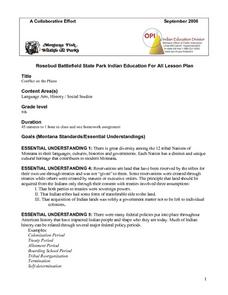





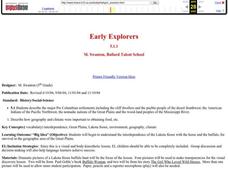

![National Anthropological Archives: Lakota Winter Counts: Teachers' Guide [Pdf] Lesson Plan National Anthropological Archives: Lakota Winter Counts: Teachers' Guide [Pdf] Lesson Plan](https://d15y2dacu3jp90.cloudfront.net/images/attachment_defaults/resource/large/FPO-knovation.png)



